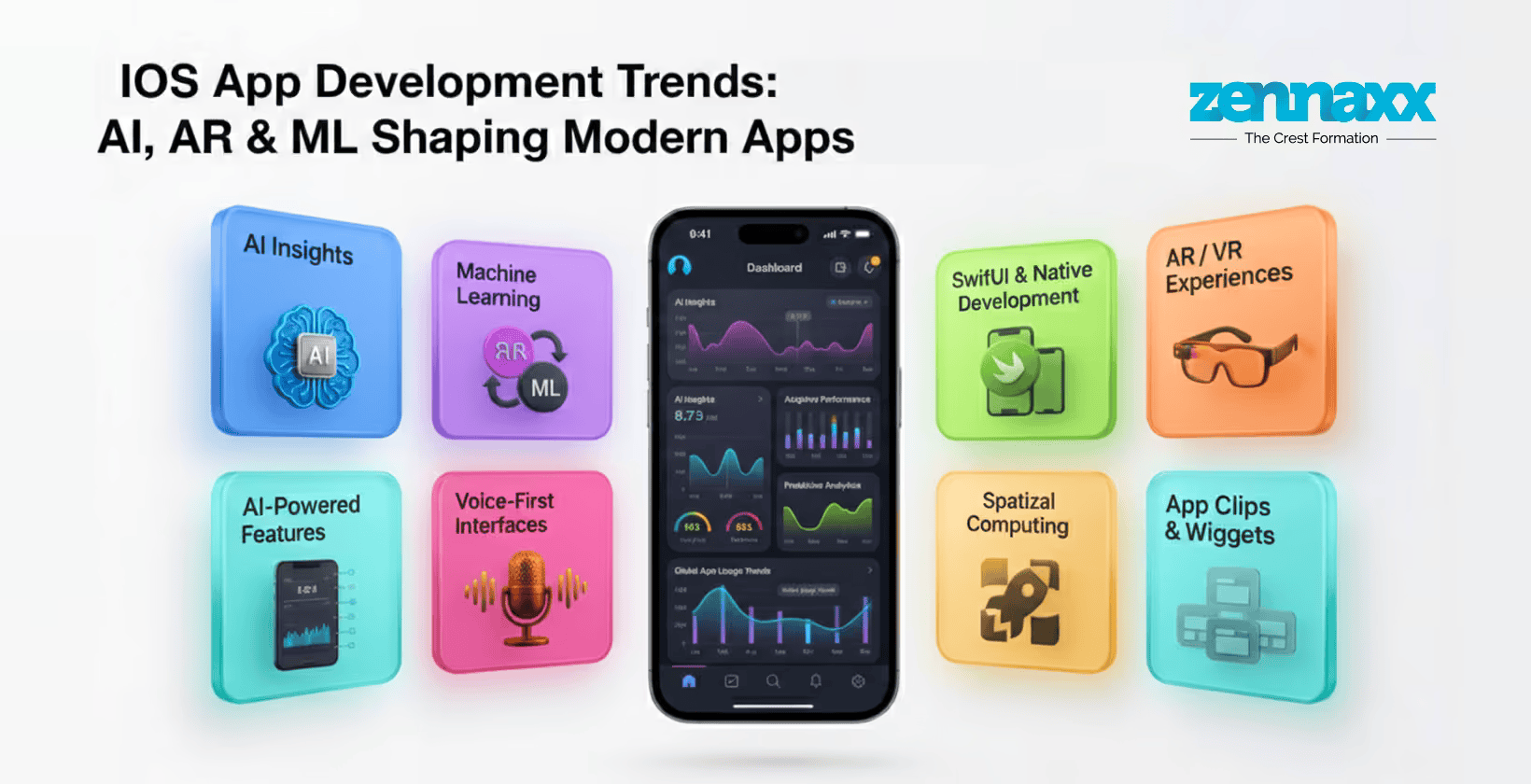
Listed below are various app types and their development costs.
- Web App: The cost of web app development ranges from $15,000 to $80,000.
- Progressive Web App (PWA): The cost of PWA development varies from $40,000 to $120,000.
- Native App (iOS/Android): The cost of native app development ranges from $25,000 to $100,000.
- Hybrid App: The cost of hybrid app development varies from $20,000 to $350,000.
- Cross-Platform App: The cost of cross-platform app development ranges from $50,000 to $500,000.
- Android App: The cost of Android app development varies between $10,000 and $150,000.
- iOS App: The cost of iOS app development ranges from $5,000 to $700,000.
- Wearable App: The cost of wearable app development varies from $10,000 to $50,000.
- Smart TV App: The cost of smart TV app development ranges from $10,000 to $50,000.
- IoT App: The cost of IoT app development varies from $20,000 to $100,000.
- Augmented Reality (AR) App: The cost of AR app development ranges from $5,000 to over $2,000,000.
- Virtual Reality (VR) App: The cost of VR app development varies from $20,000 to $200,000.
- Cloud App: The cost of cloud app development ranges from $20,000 to $150,000.
What Is Mobile App Development Cost?
The app development cost includes several key components essential for building a fully functional application.
- Planning & Research: Planning & research ensure the app aligns with market needs by conducting business analysis, gathering requirements, and defining core objectives.
- UI/UX Design: UI/UX design enhances user engagement through wireframing, prototyping, and developing an intuitive interface.
- Development: Development involves coding the frontend and backend, integrating APIs, and managing databases for seamless app functionality.
- Testing & Quality Assurance: Testing & quality assurance prevent failures by identifying bugs, securing the application, and optimizing performance.
- Deployment & Launch: Deployment & launch make the app accessible by publishing it on the App Store, Play Store, or a web platform.
- Post-Launch Maintenance: Post-launch maintenance ensures long-term usability through regular updates, security patches, and feature enhancements.
How Much Does It Cost to Develop a Mobile Application?
Listed below are 13 mobile app types and their development costs.
1. Web App
2. Progressive Web App (PWA)
3. Native App (iOS/Android)
4. Hybrid App
5. Cross-Platform Applications
6. Android App
7. iOS App
8. Wearable App
9. Smart TV App
10. IoT App
11. Augmented Reality (AR) Apps
12. Virtual Reality (VR) Apps
13. Cloud Apps
What Factors Affect the Cost of Mobile App Development?
1. Technology Used
- Frameworks and Libraries: The cost of using mobile app development frameworks and libraries depends on whether the application requires open-source or licensed tools. React Native, Flutter, and Xamarin offer cost-effective solutions, while native frameworks such as Swift and Kotlin require higher development costs due to platform-specific optimizations.
- Third-Party Integration: The cost of third-party integration varies based on API complexity, subscription fees, and custom implementations. Integrations such as payment gateways, social media logins, and AI-driven features increase development expenses.
- Cloud Services: The cost of cloud services depends on storage capacity, computing power, and security features. Cloud providers such as AWS, Google Cloud, and Microsoft Azure charge based on usage, bandwidth, and data processing needs, influencing the final cost.
2. Developer Experience and Expertise
The cost of mobile app development is influenced by the developer’s experience and expertise, with entry-level, mid-level, and senior developers charging different rates. Highly experienced developers ensure better optimization, scalability, and security, improving the overall development process.
- Entry-Level App Developer: The cost of hiring an entry-level app developer ranges from $25 to $50 per hour, with daily rates of $200 to $400, weekly rates of $1,000 to $2,000, and monthly rates of $4,000 to $8,000. Project-based hiring starts at $5,000 for simple applications. Entry-level developers assist in UI/UX design, bug fixing, and basic coding. The best practice for entry-level developers is to follow coding guidelines, use modular programming, and conduct frequent code reviews to maintain quality.
- Mid-Level App Developer: The cost of hiring a mid-level app developer ranges from $50 to $100 per hour, with daily rates of $400 to $800, weekly costs of $2,000 to $4,000, and monthly rates between $8,000 and $16,000. Project-based hiring starts at $15,000, depending on complexity. Mid-level developers handle API integrations, backend development, and application optimization. The best practice for mid-level developers is to implement clean architecture, use automated testing, and optimize database queries to enhance performance.
- Senior App Developer: The cost of hiring a senior app developer starts at $100 per hour and goes up to $200 per hour, with daily rates exceeding $1,500, weekly costs of $5,000 to $10,000, and monthly expenses between $20,000 and $40,000. Project-based pricing starts at $50,000 for enterprise-level applications. Senior developers are responsible for system architecture, security, and cloud infrastructure. The best practice for senior developers is to ensure high-level security, implement scalable architectures, and perform in-depth performance analysis to create a stable and efficient application.
3. Development Stage
The development stage affects the overall cost of mobile app development based on requirement analysis, planning, design, prototyping, development, testing, deployment, and maintenance. Each stage contributes to the final cost, depending on the team size, complexity, and time required.
- Requirement Analysis: The requirement analysis stage defines the business objectives, target audience, and app features. The cost of requirement analysis ranges from $5,000 to $15,000, including market research, competitor analysis, and technical feasibility assessment.
- Planning and Feasibility Study: The planning and feasibility study evaluates the project scope, technical limitations, and potential risks. The cost of planning ranges from $10,000 to $25,000, covering resource allocation, timeline estimation, and budgeting.
- System Design: The system design stage involves creating wireframes, architecture diagrams, and database structures. The cost of system design varies from $10,000 to $30,000, depending on app complexity and UI/UX design requirements.
- Prototyping: The prototyping stage builds an interactive app model to test user experience and functionality. The cost of prototyping ranges from $5,000 to $20,000, covering low-fidelity wireframes, high-fidelity UI mockups, and clickable prototypes.
- Development: The development stage includes coding, database integration, and API implementations. The cost of development starts at $30,000 and can go up to $150,000, depending on features, backend complexity, and platform compatibility.
- Testing and Quality Assurance: The testing stage ensures the app is free of bugs, secure, and performs optimally. The cost of testing and QA varies from $10,000 to $40,000, covering manual and automated testing, security audits, and performance evaluations.
- Deployment: The deployment stage involves launching the app on app stores and cloud environments. The cost of deployment ranges from $5,000 to $15,000, covering server configuration, app store submission, and compliance testing.
- Maintenance and Support: The maintenance stage provides ongoing updates, security patches, and bug fixes. The cost of maintenance can range from $5,000 to $50,000 per year, depending on update frequency and cloud hosting expenses.
4. Features Availability
- Simple Features: The simple features include log-in, in-app onboarding, a home page with content, a user profile, search functionality, app settings, notifications, alerts, reviews & likes, chat, content filters, content creation (uploading photos, and videos), video player and photo viewer, and feedback & reviews. The cost of an application having simple features ranges from $10,000 to $60,000, covering basic UI/UX, fundamental backend setup, and minimal third-party integrations.
- Intermediate Features: The intermediate features include push notifications, in-app messaging, payment gateway integration, location services (GPS), social media integration, customizable user profiles, real-time updates, offline mode, cloud synchronization, multi-language support, dark mode, analytics and reporting, seamless navigation (intuitive UI/UX), and e-commerce integration. The cost of an application having intermediate features ranges from $60,000 to $150,000, including real-time functionalities, enhanced user experience, cloud integration, and API-based services.
- Advanced Features: The advanced features include augmented reality (AR), artificial intelligence (AI) integration, chatbots, advanced security features, file upload and sharing, multi-platform support (cross-platform), video/audio streaming, personalized recommendations, and design with sophisticated UI/UX animations. The cost of an application having advanced features ranges from $150,000 to $500,000, incorporating AI-powered automation, real-time analytics, machine learning models, and high-end user personalization.
5. Location of Hiring Developer
- United States: Developers in the United States charge between $50 to $150 per hour, with in-house salaries ranging from $80,000 to $150,000 per year. In Chicago, junior developers charge $32 to $40 per hour, while senior developers earn up to $73 per hour. In Houston and Charlotte, NC, rates align with national averages. Texas developers earn approximately $7,877 per month, and Austin offers competitive salaries due to its strong tech industry.
- United Kingdom: Freelancers in the United Kingdom charge between $30 to $40 per hour, while in-house developers earn between $90 to $100 per hour. Developer costs in the UK are slightly lower than in the U.S., but they remain among the highest in Europe due to high demand and expertise.
- Australia: Developers in Australia charge an average of $80 per hour for freelance work, while in-house developers earn between $110,000 and $130,000 per year. Due to the high cost of living, hiring developers in Australia is expensive, but they offer strong technical expertise and reliable services.
- Canada: Canadian developers charge between $40 to $90 per hour, with an average rate of $57.46 per hour. In-house developers earn slightly less than their U.S. counterparts. Developer costs in Canada are influenced by location, with cities like Toronto and Vancouver having higher salaries due to the concentration of tech companies.
- Germany: Developer costs in Germany range from €40 to €60 per hour for junior developers, €60 to €90 per hour for mid-level professionals, and €90 to €150 per hour for senior developers. Germany remains one of the most expensive locations in Europe for hiring developers, but it offers top-tier technical talent and innovation.
- India: Freelance developers in India charge between $10 to $150 per hour, while dedicated development teams cost between $600 to $3,500 per month. Due to lower labor costs, India remains a popular choice for outsourcing and provides a balance of affordability and technical expertise.
- Pakistan: Freelancers in Pakistan charge between $25 to $125 per hour, offering cost-effective solutions for mobile app development. Development costs in Pakistan vary based on expertise and project requirements which makes it a competitive outsourcing destination.
- Malaysia: Developer rates in Malaysia range from $8 to $15 per hour for junior developers, $15 to $25 per hour for mid-level developers, and $25 to $50 per hour for senior developers. Malaysia provides an affordable alternative for development services while maintaining good quality standards.
- Philippines: Developers in the Philippines charge an average of $15 per hour for freelance work. The Philippines is a growing hub for outsourcing, offering competitive developer rates for mobile and web applications.
- Indonesia: Freelance developers in Indonesia start at $10 per hour, though costs vary based on project complexity. Indonesia provides cost-effective development services, which makes it a viable option for outsourcing mobile app development.
6. Mobile App Industry
- Dating Apps: The cost of developing a dating app ranges from $25,000 to $200,000, depending on features such as geolocation, real-time messaging, and profile verification. Top dating apps include Tinder, Bumble, Hinge, and OkCupid.
- Fitness Apps: The cost of developing a fitness app varies between $50,000 and $150,000, influenced by features such as workout tracking, AI-driven coaching, and wearable device integration. Leading fitness apps include MyFitnessPal, Peloton, Fitafy, and BetterMe.
- News Apps: The cost of developing a news app ranges from $10,000 to $50,000, depending on content aggregation, push notifications, and multimedia support. Popular news apps include BBC News, CNN, Reuters, and The New York Times.
- Food Delivery Apps: The cost of developing a food delivery app varies between $20,000 and $100,000, depending on real-time tracking, payment gateways, and restaurant partnerships. Leading food delivery apps include UberEats, DoorDash, Grubhub, and Deliveroo.
- Meditation Apps: The cost of developing a meditation app typically ranges from $30,000 to $70,000, based on guided audio sessions, habit tracking, and AI-generated mindfulness routines. Features such as community integration and sleep tracking increase development costs. Top meditation apps include Calm, Headspace, Insight Timer, and Simple Habit.
- Sports Apps: The cost of developing a sports app falls between $50,000 and $150,000, influenced by live streaming, real-time score updates, and interactive fan engagement. Popular sports apps include ESPN, theScore, Yahoo Sports, and Bleacher Report.
- Marketplace Apps: The cost of developing a marketplace app ranges from $50,000 to $200,000, depending on e-commerce features, payment processing, and inventory management. Customization, user reviews, and recommendation engines further impact the pricing of marketplace apps. Well-known marketplace apps include eBay, Amazon, Etsy, and Craigslist.
- Social Media Apps: The cost of developing a social media app varies between $50,000 and $250,000, depending on content sharing, live streaming, and community engagement features. AI-powered feeds, augmented reality (AR) filters, and monetization tools increase the cost of social media apps. Leading social media apps include Facebook, Instagram, Twitter, and Snapchat.
- Travel Apps: The cost of developing a travel app ranges from $30,000 to $150,000, based on booking systems, itinerary management, and real-time navigation. AI-driven travel recommendations and flight tracking impact the overall expenses of travel apps. Leading travel apps include Airbnb, Booking.com, TripAdvisor, and Expedia.
- Banking Apps: The cost of developing a banking app ranges from $100,000 to $500,000, depending on security compliance, biometric authentication, and real-time transaction monitoring. Advanced fraud detection, AI-driven financial insights, and blockchain integration increase the costs of banking apps. Leading banking apps include Chase Mobile, Bank of America, Wells Fargo, and Revolut.
7. Hiring Model
- In-House Development: In-house development involves building an internal team to handle the entire app development process, ensuring full control over the project. The cost of in-house development ranges from $80,000 to $200,000 per year, which includes salaries, benefits, and infrastructure expenses. The in-house development model is ideal for long-term projects requiring continuous updates and maintenance.
- Freelancers: Freelancers offer a flexible and cost-effective solution for short-term or small-scale projects. The cost of hiring freelancers varies between $15 and $150 per hour, which depends on expertise and location.
- Development Agencies: Development agencies provide end-to-end app development services, handling everything from design to deployment with a structured workflow. The cost of hiring a development agency ranges from $20,000 to $500,000 per project, depending on app complexity and service quality. Agencies are suitable for businesses looking for comprehensive solutions with professional oversight.
- Dedicated Teams: Dedicated teams function as an extension of an organization, working exclusively on the assigned project while offering flexibility in scaling resources. The cost of hiring a dedicated team ranges from $4,000 to $20,000 per month, depending on team size and expertise. The dedicated team model provides a balance between in-house development and outsourcing, ensuring long-term collaboration.
- Project-Based Outsourcing: Project-based outsourcing involves hiring external professionals or agencies to complete a specific development task within a fixed timeline and budget. The cost of outsourcing app development varies between $10,000 and $300,000 per project, depending on scope and complexity. The project-based outsourcing model suits companies seeking a structured approach with minimal internal involvement.
- Onshore, Nearshore, Offshore Development: Onshore development refers to hiring professionals within the same country, nearshore development involves neighboring countries, and offshore development relies on remote teams from distant regions. The cost of onshore development is typically $100 to $250 per hour, nearshore development ranges from $50 to $150 per hour, while offshore development costs $15 to $75 per hour. Offshore development is the most cost-effective but involves communication and time zone challenges.
What Are the Hidden Associated Costs With Mobile App Development?
Listed below are 5 hidden costs associated with mobile app development.
1. Publishing the Application
2. Maintaining/Operating the Application
3. Integrating Third-Party Services
4. Marketing the Application
5. Securing Data and Application
How to Reduce Mobile App Development Cost?
Listed below are 10 steps to reduce mobile app development costs effectively.
1. Define Clear Requirements
2. Start With an MVP (Minimum Viable Product)
3. Choose the Right Development Approach
4. Use Open-Source Frameworks and Tools
5. Opt for Offshore or Nearshore Development
6. Prioritize Essential Features Only
7. Using Pre-Built APIs and Third-Party Services
8. Optimize UI/UX Design Efficiently
9. Plan for Long-Term Maintenance Costs
10. Choose a Flexible Hiring Model
How to Calculate Mobile App Cost?
- Features = Total number of functionalities.
- Complexity = A value (Simple = 1, Medium = 2, Complex = 3).
- Hourly Rate = Developer’s charge per hour.
- Time Multiplier = A factor (1.5 to 2) covering testing, debugging, and management.
- User Profile (Simple) = 40 hours
- Workout Tracking (Medium) = 80 hours
- Social Sharing (Simple) = 40 hours
- Wearable Device Integration (Complex) = 120 hours
How Much Does Educational App Development Cost?
How Much Does E-Commerce App Development Cost?
How Much Does Blockchain App Development Cost?
How Much Does Logistics App Development Cost?
How Much Does Fintech App Development Cost?
Why Is Mobile App Development Costly?
Mobile app development is costly because it requires advanced functionalities, multi-platform support, and strict security implementations. Expenses of mobile app development cover user interface design, backend systems, third-party integrations, quality assurance, and continuous updates, increasing overall costs.
Is There Any Cheap Way to Develop an Application?
Yes, a mobile application can be developed at a lower cost by using no-code/low-code platforms, hybrid frameworks, or outsourcing to regions with lower development rates, reducing custom coding expenses. Cost-saving methods limit scalability, customization, and long-term performance and require future investments for upgrades.
Should I Hire a Cheap Mobile Developer?
No, you should not hire a cheap mobile developer because it leads to lower quality work, resulting in bugs, poor design, and challenges in future updates. The initial cost savings seem beneficial, but long-term expenses and project risks increase when expertise and technical skills are compromised.
Why is a mobile app development agency the best option to develop an application?
The mobile app development agency is the best option for developing an application due to its structured approach, skilled teams, and long-term support. Zennaxx stands out as a top choice, delivering high-quality, scalable, and secure applications with advanced technology. Appinventiv and Intelivita also provide expert solutions, ensuring smooth project execution and optimized performance. Mobile app development agency guarantees efficient project management, reduced risks, and ongoing maintenance.
What should be expected from a mobile app development agency?
You should expect a mobile app development agency to provide end-to-end services, including strategy planning, UI/UX design, coding, testing, deployment, and ongoing maintenance for a high-performing application. Zennaxx ensures customized, scalable, and secure solutions, aligned with business objectives to maximize efficiency. A reliable agency offers expert consultation, advanced technology integration, and continuous support to maintain app stability and long-term success.
